The law allows a police officer to use deception in an investigation. This means that during an interview by police, they can make false claims about what witnesses have seen or evidence they have recovered. They can say just about anything they want in order to get a confession as long as the deception does not result in what would be considered coercion sufficient to make someone confess to a crime they did not commit. Let’s be clear, this means that they can get away with almost any lie just short of telling you a loved one has died.
For instance, a detective might tell a burglary suspect that they have a witness who saw them enter a house, or that they found the suspects fingerprints inside the house. If the suspect knows he had never been in the house, then you might think there is little chance of getting a confession. But, recent studies have shown that suspects often confess to crimes they did not commit under the false impression that cooperating, even by admitting to something they did not do, will benefit them in the long-term, only to realize that they have created far greater problems for themselves.
Here is another example of how this might play out: A detective might tell a woman that her children will be taken from her and placed into foster care if she does not confess to a crime. The threat of losing her children is sufficient to make some people admit to doing something they didn't do. This borders on coercion, but once you have confessed it is hard to put that genie back in the bottle, because the police will begin to look through your life with a fine tooth comb trying to find anything to corroborate the confession they believe they just got. Also, the confession will be used against her in any hearings to take away her children.
Should police be allowed to blatantly lie to suspects? On the one hand, it is a very persuasive and efficient method to motivate a guilty person into confessing. It would also seem that an innocent person would see through these lies and quit talking to the police immediately. On the other hand, people who have something to fear can be intimidated and potentially pressured into confessing to something they did not do. This is especially true of non-residents without papers, people with difficulty speaking English, and those who have little or no education.
What should you do? If the police are interviewing you, they probably are looking at you as a suspect. Politely tell them you have nothing to say, and that you want an attorney.

